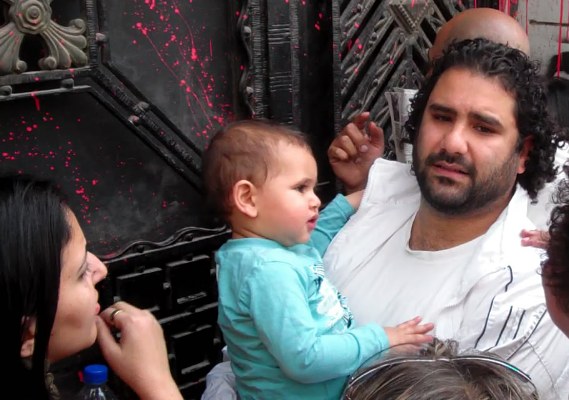Latest NEWS
- Aswat Masriya, the last word
- Roundup of Egypt's press headlines on March 15, 2017
- Roundup of Egypt's press headlines on March 14, 2017
- Former Egyptian President Hosni Mubarak to be released: lawyer
- Roundup of Egypt's press headlines on March 13, 2017
- Egypt's capital set to grow by half a million in 2017
- Egypt's wheat reserves to double with start of harvest -supply min
- Roundup of Egypt's press headlines on March 12, 2017
Alaa Abdel Fattah to remain in prison amid trial's postponement

CAIRO, Sept 10 (Aswat Masriya) – The Cairo Criminal Court postponed on Wednesday the retrial of political activist Alaa Abdel Fattah and 24 others to September 15, amid the renewed detention of three defendants.
Abdel Fattah and the 24 other defendants were sentenced to 15 years in prison in June for violating last year’s protest law, among other charges.
The retrial is taking place amid the detention of three defendants arrested after the issuance of the initial verdict; Abdel Fattah, Mohamed Nouby and Wael Metwalli.
Abdel Fattah and Nouby are on hunger strike, as well as a number of other released defendants. The defendants on trial from outside the court had announced holding a sit-in within the state-affiliated National Council for Human Rights days ago.
The court heard the testimony of witnesses during Wednesday's session and watched videos presented by the prosecution as evidence in the case, said Mahmoud Belal, among the defence team.
Belal said the defence team voiced their rejection when the court played a "personal" video for Abdel Fattah's family. The video was taken from the laptop of Abdel Fattah's wife, confiscated during his arrest in November.
"The police and the prosecution illegally obtained the video," Belal said. He added that the security authorities which carried out Abdel Fattah's arrest order did not possess a permit from the prosecution to search the defendant's house or confiscate any of his assets.
Abdel Fattah was arrested from his home in November last year for illegal assembly, blocking roads, attacking a police officer and stealing his radio. Though released in March, Abdel Fattah was sent back to jail on June 11 after the court sentenced him to 15 years in absentia for the same charge.
The defendants were initially charged with protesting without permit, attacking and resisting the authorities among other crimes.
They were arrested after the authorities dispersed a demonstration denouncing a constitutional article which permits military trials for civilians outside the Shura Council on November 26. The protest was held while the constituent assembly, which drafted the constitution, was in session inside the Shura Council.
Former interim President Adli Mansour issued the protest law on November 24 to regulate peaceful assembly. The law has long been the epicentre of wide criticism by domestic and international human rights organisations which say it violates international standards for peaceful protests.
The legislation obliges demonstrators to inform the authorities of their intention to assemble three days prior to their scheduled events. It also gives the interior ministry the right to cancel, postpone or move protests.










